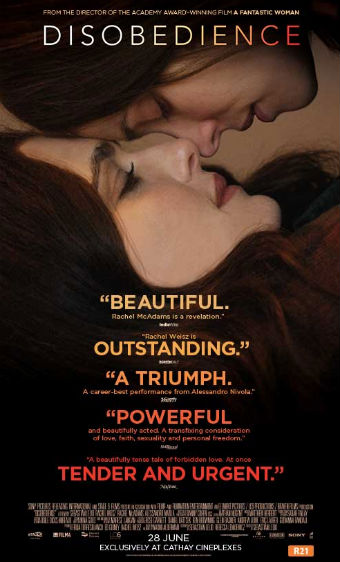DISOBEDIENCE (2018)
Genre: Drama
Director: Sebastian Lelio
Cast: Rachel McAdams, Rachel Weisz, Alessandro Nivola
RunTime: 1 hr 54 mins
Rating: R21 (Homosexual Content)
Released By: Sony Pictures Releasing International
Official Website:
Opening Day: 28 June 2018
Synopsis: The film follows a woman as she returns to the community that shunned her decades earlier for an attraction to a female childhood friend. Once back, their passions reignite as they explore the boundaries of faith and sexuality.
Movie Review:
Appropriately, ‘Disobedience’ opens with a sermon by a rabbi in a London orthodox synagogue about free will. We humans are torn between the forces of spiritual good and darkness, he says, and yet what distinguishes us from beasts and angels is the ability to choose whether or not to obey divine commandments. In other words, we are above all given the right to freedom, the right to choose, and therefore the right to disobedience. Then, much to the horror of his congregation, he collapses in front of them and dies.
It is no coincidence that Chilean director Sebastian Lelio begins with that speech, for what follows is really an exploration of how we exercise that free will, both in terms of our personal faith and our desires. For the rabbi’s long-estranged daughter Ronit (Rachel Weisz), that has meant leaving the community she was born into, and choosing to pursue her own career as a photographer in New York. In turn, the community has disavowed her, and when she returns for her father’s funeral, her appearance is greeted with muted shock.
On the other hand, for her childhood friend Esti (Rachel McAdams), that has meant repressing her teenage attraction towards Ronit and choosing to marry the rabbi’s favourite pupil Dovid (Alessandro Nivola). If she was going to be with a man, she might as well be with one of the most respected within the community, she reasoned. Yet as a scene depicting the weekly scheduled sex she and Dovid partake in, there is hardly any passion in their marriage, as and it is no surprise that Ronit’s return sets off a torrent of repressed emotions within Esti that forces her to re-examine her own choice over the years to deny her feelings for Ronit.
The love between Ronit and Esti is the beating heart of Naomi Alderman’s 2006 debut novel, and here Lelio and his co-writer Rebecca Lenkiewicz retain it as the emotional core of their film, even as they dispense with the dual-voice narrative of the source material. That said, the movie doesn’t rush into unleashing their urges for each other; instead, Lelio spends the first act building up Ronit’s return to the community that holds her in mild contempt, whether is it at a dinner with relatives or in a reading of her father’s will where she learns that he had bequeathed the family house to the community. Amidst this carefully observed detail is Esti’s initial reaction to Ronit’s presence, and Lelio brings his camera in close for us to observe her wariness slowly give way to longing.
When Ronit and Esti finally confront their long-suppressed feelings for each other at the halfway mark, the energy between them will set your heart racing. The first kiss that they share exude tortured passion and melancholy, acknowledging how much they have denied each other because of the consequences they were fully aware that they would have to confront. Their subsequent one is a lot more spontaneous, but unfortunately witnessed by two members of the community, who report Esti’s indiscretion not only to the headmistress of the school where she is teaching but also to Dovid himself. And yet, as much as Esti struggles to handle the fallout, it says a lot that she still decides to engage with Ronit in what has been and would likely be the film’s most-talked about and memorable scene.
That key scene, which finds Ronit and Esti indulge fully, completely and utterly in their yearning for each other, is beautiful and sensuous at the same time. It contains no nudity mind you, but there is no need for that for you to feel how emotionally invested these characters are given the two Rachels’ remarkable performances. There is perfect symbiosis in their masterful acting – in Weisz, you feel both the self that ran away to New York and the self that remains tethered to her past; and in McAdams, you feel both the self that wants to be free to pursue its own passions and the self that has been carefully curated to stay compliant with the strict norms of the community. Both actresses are perfectly attuned to their characters’ emotional anguish, which intensifies the sheer attraction between them expressed by their physical intimacy.
As the third side of the emotional triangle, Nivola’s supporting act is just as significant. Though he starts off as an enigmatic figure, he brings clarity to Dovid’s own inner turmoil as he deals with his wife’s change of heart. In particular, the film’s conclusion hinges on his own choice – whether to be oppressively controlling over Esti or to grant her the freedom that she asks from him – and while it is not a happy ending per se, it is a surprisingly nuanced finish which bookends the earlier speech on free will. At its essence, ‘Disobedience’ is a three-hander among Weisz, McAdams and Nivola, and watching them inhabit their fraught and complicated relationship is what makes this drama so compelling and fascinating.
Like his previous films, ‘Gloria’ and the Academy-Award winning ‘A Fantastic Woman’, this English-language debut is also about courage and claiming one’s life. To his credit, Lelio does so without ever seeming to condemn the orthodoxy of faith or imparting any will and judgment upon his characters. It is however an extremely carefully observed study of behaviours both verbal and non-verbal, where every glance and pause reveals what the characters are feeling. More than a statement of defiance, ‘Disobedience’ depicts poignantly what it truly means to be free – free from conformity, free from suffocation and free to love.
Movie Rating:




(As beautiful as it is devastating, this exploration of emotions suppressed and passions unleashed boasts remarkable, masterful performances from both its Rachels)
Review by Gabriel Chong
You might also like:





